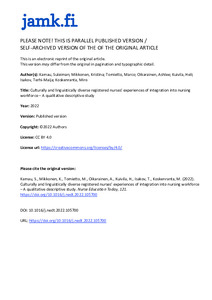Culturally and linguistically diverse registered nurses' experiences of integration into nursing workforce – A qualitative descriptive study
Kamau, Suleiman; Mikkonen, Kristina; Tomietto, Marco; Oikarainen, Ashlee; Kuivila, Heli; Isakov, Terhi-Maija; Koskenranta, Miro (2023)
Kamau, Suleiman
Mikkonen, Kristina
Tomietto, Marco
Oikarainen, Ashlee
Kuivila, Heli
Isakov, Terhi-Maija
Koskenranta, Miro
Elsevier
2023
Julkaisun pysyvä osoite on
https://urn.fi/URN:NBN:fi-fe2023030229191
https://urn.fi/URN:NBN:fi-fe2023030229191
Tiivistelmä
Background: The nursing shortage is a global and ongoing phenomenon that is expected to worsen. In many countries, imbalances in the nursing workforce will require international recruitment and plans to increase domestic and international nursing graduates. Nurses from culturally and linguistically diverse backgrounds have been reported to experience challenges while integrating into the workforce.
Aim: To describe culturally and linguistically diverse registered nurses' experiences of their integration into the Finnish nursing workforce.
Methods: The study adopted a qualitative descriptive design. Data were collected during the spring of 2021 from 24 culturally and linguistically diverse registered nurses working in various healthcare settings in Finland. Data were analyzed using content analysis, which resulted in 596 open codes, 21 sub-categories, and 8 categories.
Results: According to the performed analysis, culturally and linguistically diverse nurses in Finland face cultural, ethnic and linguistic challenges. Organizational acceptance and acknowledgement of culturally and linguistically diverse nurses' competence can help decrease the practice of deskilling and the perception that foreign nurses have purely opportunistic goals. Cultural and language learning support, tailored orientation programs, and mentorship are the most common organizational strategies for supporting integration and competence development. The role of the nurse manager and organizational strategies were also identified as essential components of smooth integration, work wellbeing and retention.
Conclusions: Finnish healthcare organizations need to implement strategies that support culturally and linguistically diverse nurses' integration into the workforce. Nurse managers are important leaders that can foster culturally and linguistically diverse nurses' competence development, ensure the efficient use of their specialized skills, promote work wellbeing, and improve nurse retention.
Aim: To describe culturally and linguistically diverse registered nurses' experiences of their integration into the Finnish nursing workforce.
Methods: The study adopted a qualitative descriptive design. Data were collected during the spring of 2021 from 24 culturally and linguistically diverse registered nurses working in various healthcare settings in Finland. Data were analyzed using content analysis, which resulted in 596 open codes, 21 sub-categories, and 8 categories.
Results: According to the performed analysis, culturally and linguistically diverse nurses in Finland face cultural, ethnic and linguistic challenges. Organizational acceptance and acknowledgement of culturally and linguistically diverse nurses' competence can help decrease the practice of deskilling and the perception that foreign nurses have purely opportunistic goals. Cultural and language learning support, tailored orientation programs, and mentorship are the most common organizational strategies for supporting integration and competence development. The role of the nurse manager and organizational strategies were also identified as essential components of smooth integration, work wellbeing and retention.
Conclusions: Finnish healthcare organizations need to implement strategies that support culturally and linguistically diverse nurses' integration into the workforce. Nurse managers are important leaders that can foster culturally and linguistically diverse nurses' competence development, ensure the efficient use of their specialized skills, promote work wellbeing, and improve nurse retention.
